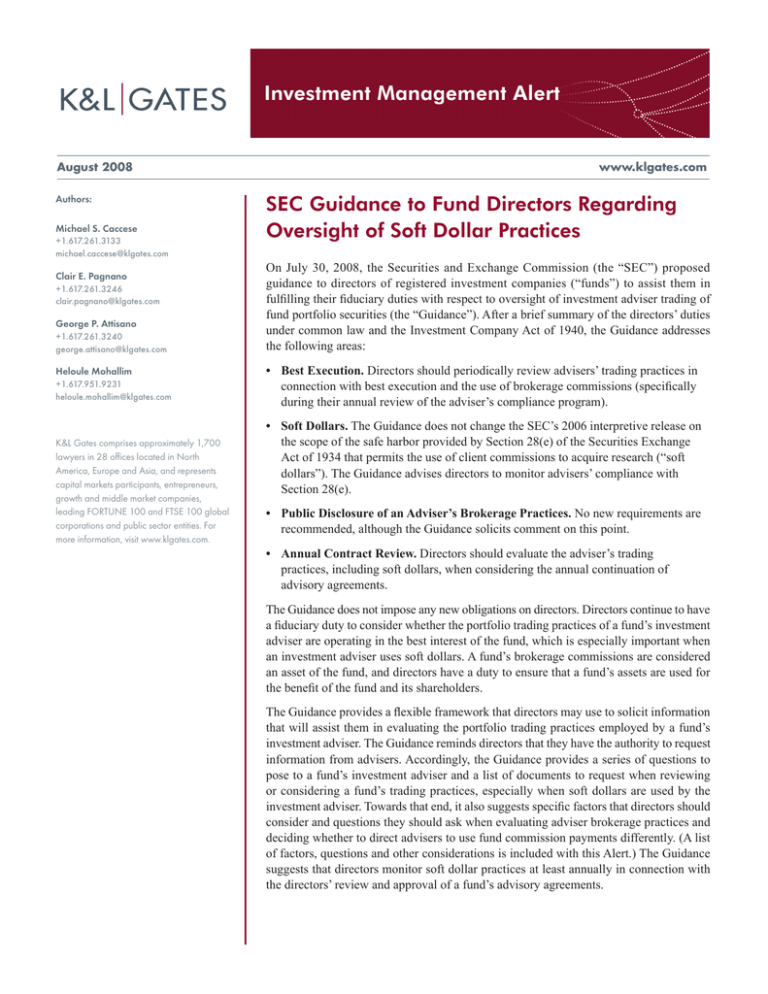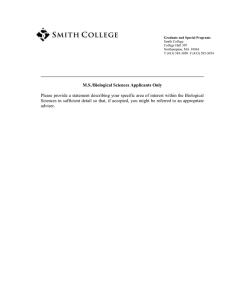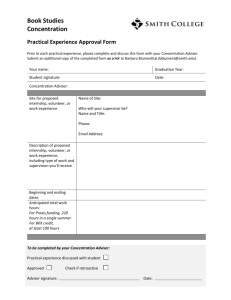
Investment Management Alert
August 2008
Authors:
Michael S. Caccese
+1.617.261.3133
michael.caccese@klgates.com
Clair E. Pagnano
+1.617.261.3246
clair.pagnano@klgates.com
George P. Attisano
+1.617.261.3240
george.attisano@klgates.com
Heloule Mohallim
+1.617.951.9231
heloule.mohallim@klgates.com
K&L Gates comprises approximately 1,700
lawyers in 28 offices located in North
America, Europe and Asia, and represents
capital markets participants, entrepreneurs,
growth and middle market companies,
leading FORTUNE 100 and FTSE 100 global
corporations and public sector entities. For
more information, visit www.klgates.com.
www.klgates.com
SEC Guidance to Fund Directors Regarding
Oversight of Soft Dollar Practices
On July 30, 2008, the Securities and Exchange Commission (the “SEC”) proposed
guidance to directors of registered investment companies (“funds”) to assist them in
fulfilling their fiduciary duties with respect to oversight of investment adviser trading of
fund portfolio securities (the “Guidance”). After a brief summary of the directors’ duties
under common law and the Investment Company Act of 1940, the Guidance addresses
the following areas:
• Best Execution. Directors should periodically review advisers’ trading practices in
connection with best execution and the use of brokerage commissions (specifically
during their annual review of the adviser’s compliance program).
•
Soft Dollars. The Guidance does not change the SEC’s 2006 interpretive release on
the scope of the safe harbor provided by Section 28(e) of the Securities Exchange Act of 1934 that permits the use of client commissions to acquire research (“soft dollars”). The Guidance advises directors to monitor advisers’ compliance with Section 28(e).
• Public Disclosure of an Adviser’s Brokerage Practices. No new requirements are
recommended, although the Guidance solicits comment on this point.
• Annual Contract Review. Directors should evaluate the adviser’s trading
practices, including soft dollars, when considering the annual continuation of
advisory agreements.
The Guidance does not impose any new obligations on directors. Directors continue to have
a fiduciary duty to consider whether the portfolio trading practices of a fund’s investment
adviser are operating in the best interest of the fund, which is especially important when
an investment adviser uses soft dollars. A fund’s brokerage commissions are considered
an asset of the fund, and directors have a duty to ensure that a fund’s assets are used for
the benefit of the fund and its shareholders.
The Guidance provides a flexible framework that directors may use to solicit information
that will assist them in evaluating the portfolio trading practices employed by a fund’s
investment adviser. The Guidance reminds directors that they have the authority to request
information from advisers. Accordingly, the Guidance provides a series of questions to
pose to a fund’s investment adviser and a list of documents to request when reviewing
or considering a fund’s trading practices, especially when soft dollars are used by the
investment adviser. Towards that end, it also suggests specific factors that directors should
consider and questions they should ask when evaluating adviser brokerage practices and
deciding whether to direct advisers to use fund commission payments differently. (A list
of factors, questions and other considerations is included with this Alert.) The Guidance
suggests that directors monitor soft dollar practices at least annually in connection with
the directors’ review and approval of a fund’s advisory agreements.
Investment Management Alert
The Guidance strongly recommends that fund directors
seek certain data regarding the adviser’s trading
practices. In particular, the Guidance suggests that the
directors periodically obtain:
• A list of broker-dealers to which the adviser has
allocated fund brokerage
• The commission rates paid
• The total commissions paid to each broker-dealer
• The total value of executed securities allocated to
each broker-dealer
• The fund’s portfolio turnover rates
The Guidance indicates that advisers typically provide
these data to fund boards. While this may be true,
and it comports with our experience, some of these
data may not be necessary. For example, a list of all
broker-dealers may provide too much data if the list is
long and many brokers were used only sporadically.
Significantly, the Guidance does not require or
suggest that boards obtain data “unbundling” the
cost of proprietary research from the cost of “pure”
execution.
Although the Guidance does not require any additional
disclosure, the Guidance suggests that there is a trend
towards more disclosure by advisers to boards regarding
brokerage practices. Certainly the Guidance will
encourage any such trend. Many boards are likely to
use the Guidance as at least a partial blueprint for their
evaluation of fund advisers’ trading practices. Thus,
fund advisers are likely to see enhanced requests for
information from directors and more frequent inquiries
regarding these practices. Fund advisers are also likely
to see heightened scrutiny during the annual contract
renewal process regarding their use of soft dollars in
order to satisfy directors that such commissions are
being used in the best interest of the fund.
All comments in response to issues raised in the
Guidance must be submitted to the SEC no later than
October 1, 2008. Please do not hesitate to contact a
K&L Gates lawyer if you have questions about the
scope of the Guidance.
K&L Gates comprises multiple affiliated partnerships: a limited liability partnership with the full name K&L Gates LLP qualified in Delaware and maintaining offices
throughout the U.S., in Berlin, in Beijing (K&L Gates LLP Beijing Representative Office), and in Shanghai (K&L Gates LLP Shanghai Representative Office); a limited
liability partnership (also named K&L Gates LLP) incorporated in England and maintaining our London and Paris offices; a Taiwan general partnership (K&L Gates)
which practices from our Taipei office; and a Hong Kong general partnership (K&L Gates, Solicitors) which practices from our Hong Kong office. K&L Gates
maintains appropriate registrations in the jurisdictions in which its offices are located. A list of the partners in each entity is available for inspection at any K&L Gates
office.
This publication/newsletter is for informational purposes and does not contain or convey legal advice. The information herein should not be used or relied upon in
regard to any particular facts or circumstances without first consulting a lawyer.
Data Protection Act 1998—We may contact you from time to time with information on K&L Gates LLP seminars and with our regular newsletters, which may be of
interest to you. We will not provide your details to any third parties. Please e-mail london@klgates.com if you would prefer not to receive this information.
©1996-2008 K&L Gates LLP. All Rights Reserved.
August 2008 | 2
Investment Management Alert
Appendix: Information Requests for
Fund Directors Regarding Soft Dollars
To assist in reviewing the adviser’s use of soft dollars,
directors should request the following information:
• How does the adviser determine the total amount
of brokerage and research products and services
(“Research”) to be obtained and how will the
Research be provided? In particular, how does the
adviser determine:
○ The amount to be spent using “hard” as
opposed to “soft” dollars?
○ The amount to be spent on proprietary as
opposed to third-party Research?
○ What types of Research will be obtained and
are these beneficial to the fund?
○ The amount to be used in commission
recapture programs and expense
reimbursement programs?
• How does the adviser establish a soft dollar
budget and allocate brokerage? Is a broker vote
process or some other mechanism used?
• Does the adviser use alternative trading venues
that produce soft dollar credits?
○
Is the amount of commissions paid reasonable
(based upon a good faith determination) in light of the value of Research? How does the adviser assess the value of Research?
• How does soft dollar usage compare to the
adviser’s total commission budget?
• How is Research allocated among clients? Are
the fund’s commission rates similar to those of
the adviser’s other clients for comparable trades?
If other clients do not pay soft dollars, does the
adviser adequately demonstrate that the fund is
not subsidizing Research provided to the other
clients? To what extent is Research used for other
funds or clients that engage primarily in fixedincome transactions?
• How does the adviser evaluate mixed-use
Research?
• To what extent does the adviser use soft dollars?
What effect does this have on broker-dealer
selection? How does using soft dollars benefit
the fund?
• How does the adviser determine that the use of
soft dollars complies with Section 28(e)?
In particular:
○
Is the Research eligible under Section 28(e), i.e., does it provide lawful and appropriate
assistance to the adviser in carrying out its
investment decision-making responsibilities?
August 2008 | 3






![Literature Option [doc] - Department of French and Italian](http://s3.studylib.net/store/data/006916848_1-f8194c2266edb737cddebfb8fa0250f1-300x300.png)